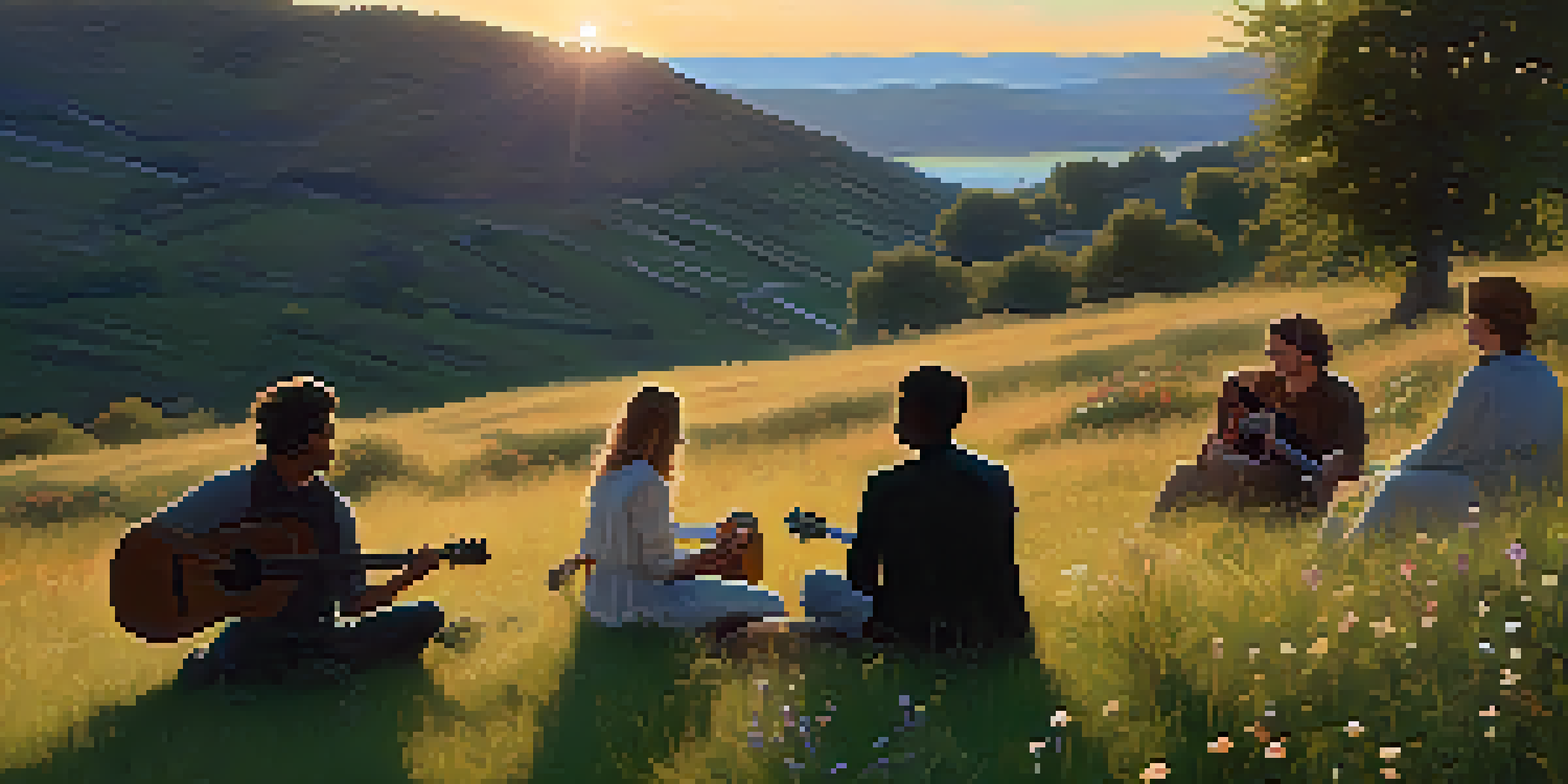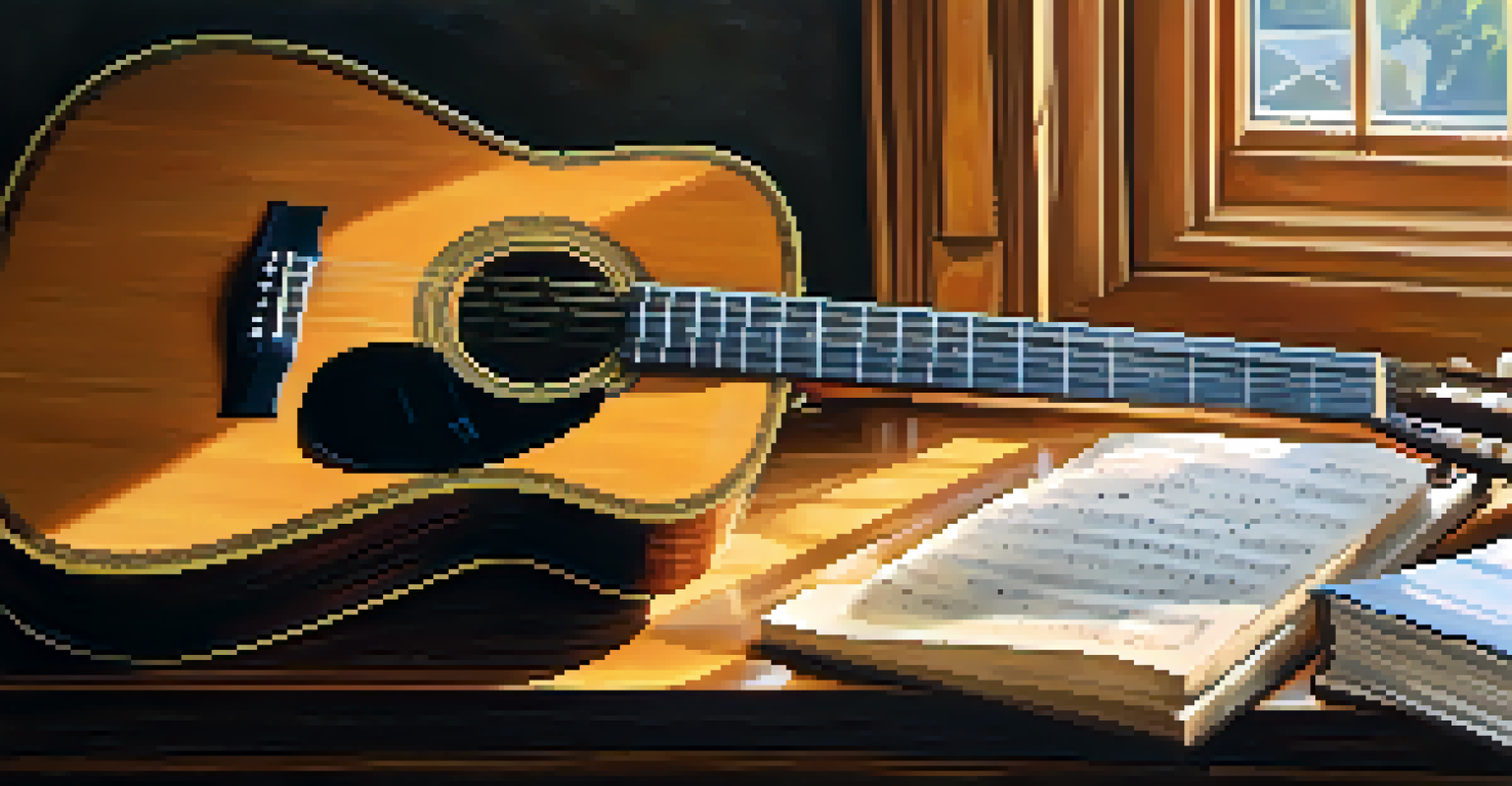Folk Guitar Music: A Vessel for Cultural Storytelling

The Roots of Folk Guitar Music and Its Cultural Significance
Folk guitar music has deep roots in various cultures, serving as a reflection of societal values and traditions. From the Appalachian mountains to the streets of Buenos Aires, this genre embodies the stories and struggles of everyday people. The guitar, often seen as a humble instrument, becomes a powerful voice for those who may not have a platform otherwise.
Music is the shorthand of emotion.
Through its melodies and lyrics, folk music captures the essence of a community's identity. For example, traditional ballads often recount historical events or personal tales, connecting generations through shared experiences. As listeners, we can find pieces of ourselves in these songs, bridging cultural gaps and fostering understanding.
Moreover, folk guitar music is a living archive, preserving languages and dialects that might otherwise fade away. Each strum of the guitar is a reminder of the rich tapestry of human experience, illustrating how music can serve as a vessel for cultural storytelling across time and space.
Storytelling Through Lyrics: The Heart of Folk Music
At the core of folk guitar music lies its storytelling prowess, where lyrics hold deep meaning and emotion. These narratives often revolve around love, loss, and life lessons, making them universally relatable. For instance, songs like 'This Land Is Your Land' not only celebrate the beauty of the land but also highlight social issues, encouraging listeners to reflect on their own experiences.

The beauty of folk lyrics is their ability to evoke imagery and emotion, allowing listeners to visualize the stories being told. Each verse can transport us to a different time and place, immersing us in the lives of others. This connection is what makes folk music so powerful; it resonates with our own stories and experiences.
Folk Music Reflects Cultural Identity
Folk guitar music serves as a powerful medium for expressing and preserving the unique narratives and values of diverse communities.
Additionally, folk music often serves as a means of documenting historical events and cultural changes. By weaving personal narratives into broader social contexts, artists create a tapestry of history that listeners can engage with, ensuring that these stories are passed down through generations.
Instruments and Styles: Diversity in Folk Guitar Music
Folk guitar music is celebrated for its diversity, encompassing various styles that reflect different cultural backgrounds. From the fingerpicking techniques of American folk to the flamenco rhythms of Spain, each style tells its own story through unique sounds. This variety showcases the adaptability of the guitar as an instrument, capable of expressing a wide range of emotions.
Folk music is a way of expressing who we are and where we come from.
The way artists choose to play the guitar can also influence the storytelling aspect of their music. For example, a soft, melodic strum may evoke feelings of nostalgia, while a vigorous, rhythmic picking can convey urgency and passion. These nuances allow musicians to craft their narratives in a way that resonates with the listener on multiple levels.
Moreover, the collaboration of different instruments within folk music creates a rich auditory landscape. The interplay between the guitar, banjo, fiddle, and even percussion adds layers to the storytelling, enriching the overall experience. This fusion of sounds not only enhances the narrative but also highlights the interconnectedness of various cultures.
Folk Music Festivals: Celebrating Cultural Heritage
Folk music festivals serve as vibrant platforms for celebrating cultural heritage and storytelling. These events bring together artists from diverse backgrounds, allowing them to share their narratives through music. For attendees, it's an opportunity to immerse themselves in different cultures, fostering appreciation and understanding.
At festivals, the atmosphere is often electric, with audiences engaging in sing-alongs and dances. This communal experience makes folk music a shared journey, where everyone becomes a part of the storytelling. Such gatherings highlight the importance of community in folk traditions, reinforcing bonds among participants.
Storytelling is Central to Folk Music
The rich storytelling within folk lyrics captures universal experiences, allowing listeners to connect deeply with the emotions and histories portrayed.
Furthermore, festivals often feature workshops and discussions, enabling participants to learn about the history and significance of various folk traditions. This educational aspect ensures that cultural storytelling is not only enjoyed but also understood and respected, preserving these rich narratives for future generations.
The Revival of Folk Music in Contemporary Culture
In recent years, there has been a notable revival of folk music, with contemporary artists drawing inspiration from traditional sounds. This resurgence reflects a growing appreciation for authenticity in music and storytelling. Artists like Mumford & Sons and The Lumineers have brought folk elements into the mainstream, inviting a new audience to explore its rich narratives.
This revival is not just about nostalgia; it's about reinterpreting folk stories for modern listeners. Contemporary folk musicians often tackle current social issues, weaving them into their lyrics while maintaining the essence of traditional storytelling. This fusion ensures that folk music remains relevant and resonant in today's fast-paced world.
Moreover, digital platforms have made it easier for indie folk artists to share their music globally. With a click of a button, listeners can access a plethora of folk songs, ensuring that cultural narratives continue to thrive and evolve. This accessibility encourages a new generation to engage with folk music, keeping the storytelling tradition alive.
The Role of Folk Music in Cultural Identity
Folk guitar music plays a crucial role in shaping and expressing cultural identity. For many communities, these songs serve as a means of affirming their heritage and preserving their unique narratives. The melodies and lyrics often reflect the values, struggles, and triumphs of a specific cultural group, fostering a sense of belonging among its members.
As individuals engage with folk music, they often find a deeper connection to their past. This connection can spark conversations between generations, as elders share stories behind the songs that have been passed down. In this way, folk music becomes a bridge between the past and the present, reinforcing cultural continuity.
Folk Music's Revival in Modern Times
Contemporary artists are revitalizing folk music by blending traditional sounds with modern themes, ensuring its relevance for new audiences.
Additionally, folk music can be a powerful tool for activism, giving voice to marginalized communities. By sharing their stories through song, artists can raise awareness about social issues, encouraging listeners to reflect on their own beliefs and values. This aspect of folk music highlights its significance not just as entertainment but as a means of cultural expression and social change.
The Future of Folk Guitar Music and Cultural Storytelling
As we look to the future, folk guitar music will continue to evolve while remaining a vital form of cultural storytelling. The blending of traditional sounds with modern influences ensures that these narratives will resonate with new audiences. This adaptability is essential for keeping folk music alive, allowing it to thrive in an ever-changing musical landscape.
Moreover, the rise of technology and social media provides new avenues for folk musicians to share their stories. Artists can reach global audiences, fostering a sense of community among fans who share a passion for storytelling through music. This interconnectedness encourages collaboration and experimentation, paving the way for innovative folk compositions.

Ultimately, the enduring power of folk guitar music lies in its ability to connect us through shared narratives. As long as there are stories to tell and experiences to share, folk music will remain a cherished vessel for cultural storytelling, enriching our lives and reminding us of our shared humanity.